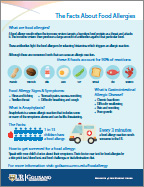Food Allergies
Food Allergies
Food allergy are abnormal responses of the body's immune system to certain foods. They are not the same as food intolerance, although some of the symptoms may be very similar.
Causes of Food Allergies
A person must be exposed to the food at least once before the allergic symptoms happen. At that time, the immune system releases IgE antibodies that react to the food. Histamines are released. These cause allergy symptoms such as hives, asthma, itching in the mouth, trouble breathing, stomach pains, vomiting, or diarrhea.
About 90% of all food allergies are caused by the following 8 foods:
- Milk
- Eggs
- Wheat
- Soy
- Tree nuts
- Fish
- Shellfish
- Peanuts
Some facts about food allergies:
- Eggs, milk, and peanuts are the most common causes of food allergies in children.
- Peanuts, tree nuts, fish, and shellfish commonly cause the most severe reactions.
- Nearly 5% of children under the age of 5 years have food allergies.
- From 1997 to 2007, food allergies increased 18% among children under age 18 years.
- Most children "outgrow" their allergies, however, allergies to peanuts, tree nuts, and shellfish may be lifelong.
- According to the National Institute of Allergy and Infectious Diseases, it doesn't take much food to cause a severe allergic reaction—1/44,000 of a peanut can cause a severe reaction in a highly allergic person.
Symptoms of Food Allergies
Allergic symptoms may begin within minutes to an hour after eating the food. The following are the most common symptoms of a food allergy. However, each person may experience symptoms differently. Symptoms may include:
- Swelling, itching of lips and mouth
- Tightness in the throat or hoarse voice
- Nausea and vomiting
- Diarrhea and cramps
- Hives, or itchy, raised bums
- Swelling of the skin
- Itching
The symptoms of a food allergy may look like other medical conditions or problems. Always talk with your healthcare provider for a diagnosis.
Severe Symptoms of Food Allergies
Anaphylaxis is a severe allergic reaction and is life-threatening. Symptoms can include those above as well as the following:
- Trouble breathing or wheezing
- Feeling as if the throat is closing or that the lips and tongue are swelling
- Flushing of the skin
- Itching of palms, soles of feet
- Feeling faint
- Nausea
- Fast pulse
- Low blood pressure
- Loss of consciousness
Anaphylaxis is a medical emergency. Call 911 for immediate medical assistance. Severe allergic reactions are treated with epinephrine. Those with known severe allergies should carry emergency kits with self-injecting epinephrine or Epi-pens.
Treating Food Allergies in Children
As in adults, it is very important to avoid these foods that cause allergies. If you are breastfeeding your child, it is important that you discuss with your child's healthcare provider whether it is necessary to avoid foods to which your child is allergic.
You may need to give vitamins to your child if they are unable to eat certain foods. Discuss this with your child's healthcare provider.
Your child's healthcare provider may also prescribe an emergency kit. Be sure to ask your child's healthcare provider about an emergency kit if you don't already have one.
Some children under the supervision of their healthcare provider, may be given certain foods after some period of avoidance. This determines whether or not the child has outgrown the allergy.
Food Allergies Quiz
Take this quiz and learn how to better cope with food allergies.
